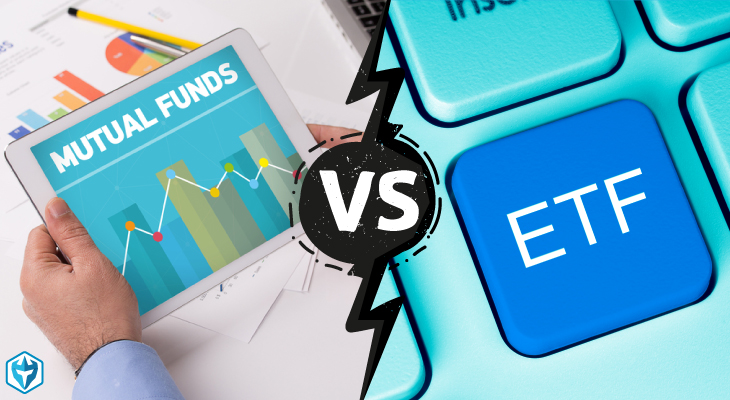Mutual Funds vs ETFs: Which One is Right for You?

Introduction to Mutual Funds vs ETFs
Savings is a strong machine for accumulating wealth in the long run. There are two types of investments: Mutual Funds and ETFs or Exchange Traded Funds. Both are excellent opportunities to expand your portfolio, but they are not identical – they have certain characteristics.
It will be easier to make your choices depending on what you want to achieve, as we will establish the difference between the two. You will be able to learn about Mutual Funds and ETFs in this article, their costs, flexibility, performance, and taxes and how to decide between investing in them.
Understanding Mutual Funds and ETFs: An Overview
Mutual funds and ETFs are both investment products in which many investors pool their money to invest in a basket of securities. Mutual funds are usually operated by fund managers while ETFs just like stocks are publicly traded. ETFs are cheaper, and they can be purchased and traded during the day while mutual funds are purchased at the closing market price. It is crucial to know their essentials in order to differentiate between the two in terms of investment plan.
What Are Mutual Funds? Key Features and Benefits
A mutual fund is an investment company with merged stock belonging to different investors which are used to invest in stocks, bonds or other securities. The fund is under a professional fund manager who makes the fund’s investments on behalf of the investors.
Regarding their advantages, the main one is the diversification because through mutual funds a single investment gives the investor access to a number of various assets. Moreover, mutual funds are convenient for beginners because of professional management and a great number of opportunities for investing.
Exploring ETFs: How They Differ from Mutual Funds
Tracking stocks are like Mutual Funds in that they gather money from investors to invest in a variety of securities. But unlike mutual funds, ETFs are bought and sold like common stock through stock exchanges. They mean that like stocks, investors can buy and sell ETFs during the regular market hours at the price offered in the market, thus, market price.
In general, ETNs come with lower cost structures than mutual funds and are tax-wise more advantageous. But it may not appeal so much for investors who expect frequent intervention and individual approach to their investments.
Comparing the Costs: Mutual Funds vs ETFs
Another obvious difference between Mutual Funds and ETFs is price, although it reflects both the cost to own the funds as well as the tracking error. Some mutual funds also come with a relatively high cost, since they involve some level of active management: they can also attract sales commissions, management fees or redemption fees.
On the other hand ETF’s have lower charges especially index ETF’s being that they are managed passively. These fees should be watched carefully because they can erode your investment returns in the long run investors should consider ETFs as the costs are generally low.
Flexibility and Liquidity: Which Investment Vehicle Wins?
ETFs are more flexible and liquid as compared to mutual funds. The ETFs are traded like other securities on the stock exchange; they can be sold and bought at any time during the day and thus adapt well to market forces. In contrast mutual funds can only be bought or sold at the end of the trading session at the kaleidoscope net asset value or NAV price. This difference in trading flexibility clearly indicates that for more control and frequent trading ETF’s are a better bet.
Performance and Risk: A Deep Dive into Mutual Funds and ETFs
Like so, Mutual Funds and ETFs have capacity to give high returns though the performance heavily relies on wrapper assets. Although there are some similarities between mutual funds and ETFs, actively managed mutual funds may sometimes eclipse ETFs because of the manager’s skills.
However, they also offer higher risks especially when the fund manager invests of the funds. With ETFs are mostly passively managed and mimic an index and can be less aggressive in terms of returns. But its profitability is associated with the market trends, therefore, investors may experience losses during specific situations in the market.
Tax Considerations: Mutual Funds vs ETFs
Most of the ETFs are favorable when it comes to taxes compared to mutual funds. This is the case because of the nature of ETF structures which enable users to avoid capital gains taxes in the event they do not dispose off their stocks.
On the other hand, you may find that mutual funds may declare capital gains to investors through an annual distribution which leads to realization of gains that are charged on tax. Holding the need for saving taxes as relevant, investors need to choose between the two investment options following these combinations.
Choosing the Right Investment Strategy: Mutual Funds or ETFs?
When it comes to investing, the decision between Mutual Funds and ETFs depends on the following factors; objectives of the investment, level of risk that an investor can afford and time required to achieve laid down investment objectives.
If you don’t want to be actively involved and like to leave your investments to the professionals and pay more, then mutual fund is ideal for you. If you want to keep cost low, tax effectively, and make trades during the course of the day then exchange traded funds are more appropriate. Both procedures are useful in portfolio diversification; the key therefore lies in understanding your ideal investment preference.
Pros and Cons of Investing in Mutual Funds
It is favorable to invest in mutual funds because they are professionally managed,_OPTIONS THAT ARE AVAILABLE IN THE MUTUAL FUNDS;, and they provide diversification. However, there are some disadvantages: it costs more than trading in the regular exchange; capital gains taxes may be administered; and lesser trading options available with the shares.
For those investors with long term horizon who want a no hassle and minimal intervention approach, mutual funds might work for you. But in case you are more of a cost and flexibility conscious investor, then there are better investment products such as ETFs.
Pros and Cons of ETFs: What You Need to Know
Some benefits associated with ETFs include; costs, taxes and the fact that they can be traded on a daily basis. Such funds are suitable to those who believe in indexing and do not want to make active decisions about their money while seeking some level of freedom with it. Nonetheless, ETFs are known to be more inconsistent than mutual funds – especially if you are holding a concentrated position in ETFs and trading actively.
Moreover, although they are more often cheaper than mutual funds, certain industry-targeted ETFs can be rather pricey. That is why it is fundamental to have knowledge about the pros of using ETFs and the cons and therefore help in decision making whether to invest in ETFs or not.
Conclusion
Although Mutual Funds and ETFs are quite similar in their basic features, each has optimal uses for the investor depending on his goals, risk appetite and inclinations. Most often mutual funds are more diversified and managed by professionals, offer a number of options for investment, but they have higher costs and limited opportunities for active trading.
ETFs, on the other hand, are easier to trade, less expensive, more liquid, and more tax intelligent investments. As demonstrated from the above article, being able to assess your required amount and weigh the factors above you will be in a position to make the right decision of which investment vehicle to choose.







